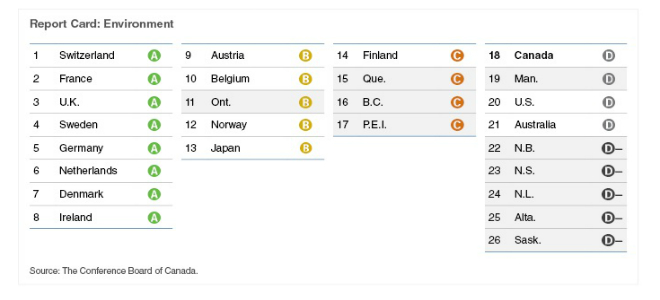Canada has earned a “D” grade on environmental performance compared to its international peers, and emits some of the highest levels of greenhouse gases.
In The Conference Board of Canada’s, How Canada Performs: Environment Report Card, Canada ranked 14th among 16 peer countries, based on nine assessment indicators that cover three areas: climate change, air pollution, and freshwater management.
For the first time in the history of the report card the provinces were also included in the rankings. Ontario is the leading province, earning a “B” and scoring 11th overall. However, Saskatchewan, Alberta, Newfoundland and Labrador, Nova Scotia and New Brunswick all received a “D–” grade and sit at the bottom in international ranking. Meanwhile, Quebec, British Columbia, and P.E.I. earned a “C” grade, while Manitoba ranked 19th with a “D.”
“While some of Canada’s poor grades can be explained by our large land mass, cold climate and resource-intensive economy, the results clearly indicate that the environmental challenges are significant and we have a long way to go towards improving our comparative environmental performance,” said Louis Theriault, vice-president of Public Policy.
Basically, the country failed on two of the three climate change indicators: GHG emissions and energy intensity. Even though Canada got an “A” for low-emitting electricity generation (about 80 per cent of electricity is generated from low emitting sources like hydro and nuclear power), it still lags behind Norway and Switzerland, France and Sweden in this regard.
On the air pollution front, Canada has some of the highest per capita emission rates. Despite improved air pollution perfromance between 1990 and 2014, it failed for it nitrogen oxide and particulate matter emissions.
Also, in the freshwater management category, Canada is “a middle-of-the-pack performer” in wastewater treatment and capita water withdrawals.
“These results show that Canada needs to encourage more sustainable consumption,” added Theriault. “Protecting the environment from damage is not a problem for tomorrow but a challenge for today.”






